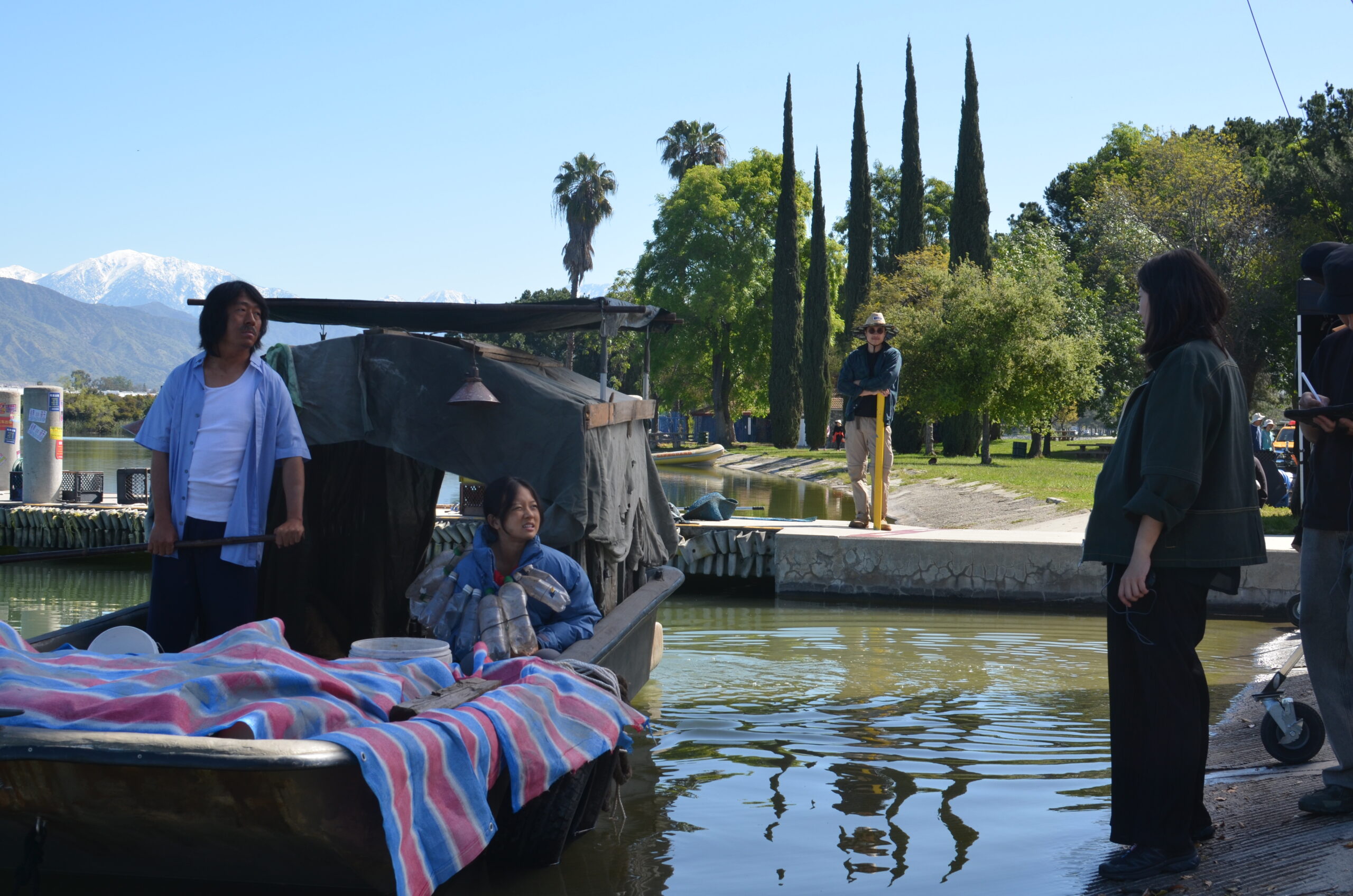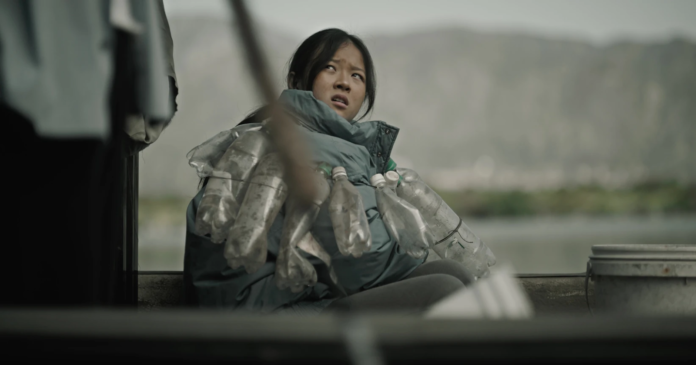( ENSPIRE Entertainment ) Indeed Rising Voices Program Partnered With Lena Waithe On BIPOC Short Film “Corpse Fishing”
ENSPIRE Contributor: Gabrielle Maya
“Corpse Fishing” is a haunting, poignant short film created by Jean Liu, a British Chinese director. It was produced by Sarah Park and Lena Waithe and starred Harmonie He and Jizhong Zhang. Based on the true story of ‘body fishermen’ in China, this powerful drama follows Yan, a young girl who is searching for her missing father with a mysterious stranger. This evocative short explores grief and longing, garnering critical acclaim. “Corpse Fishing” has been qualified to be considered for the 2025 Oscars.
A graduate of USC’s Peter Stark Producing Program and a Pigott/BAFTA scholar, Liu specializes in storytelling and subculture personalities in her work. Her portrait-styled films have been featured internationally at SXSW, Slamdance, and other film festivals. She combines live performance with immersive media experience and technology, producing large-scale projects for live audiences. Her film work has appeared on sites such as BBC and NOWNESS. “Corpse Fishing” was part of Indeed’s Rising Voices program, an initiative to discover, invest in, and share stories created by BIPOC filmmakers and storytellers. It was partnered with Lena Waithe, Hillman Grad Productions, and 271 Films.

We spoke with director Jean Liu about the inspiration behind the story of “Corpse Fishing” and the personal connection between the powerful narrative. She shares her background and influence when approaching storytelling to connect with diverse audiences. Also, Liu speaks about her specialization in subcultures and personalities in storytelling, immersive media, live performance in her projects, and more.
What inspired you to tell the story of “Corpse Fishing” and explore the world of body fishermen in China? Was there a personal connection to the subject matter, or were you drawn to the unique and powerful narrative?
This is a real-life profession that I have encountered! I used to work in China as a documentary producer and came across corpse fishers in my research. Originally, I had wanted to shoot a documentary about them. Still, given the very sensitive nature of their work and the difficulty of getting access to the subjects, it was probably better suited as a narrative story. The work’s uniqueness and the deep moral conflict that corpse fishers endure left a huge impact on me all those years ago, and I’ve been trying to find a way to tell their story ever since.
How does your background as a British Chinese director influence your approach to storytelling and ability to connect with diverse audiences?
Well, first of all, it means I get to tell stories in two different languages! Growing up, watching a lot of British TV, I think I’m significantly influenced by British comedy – there was a lot of absurd, dark stuff like The League of Gentlemen and Nighty Night on BBC that probably wouldn’t make it to mainstream US programming. Then, on the Chinese side, I’m very interested in exploring the societal themes that exist there. I suppose many of my characters are imbued with personalities or qualities I’ve encountered in China, but then they are presented through my British storytelling lens. I don’t know if that means I’m connecting with more audiences or less! But I love that different people pick up on specific details in my stories and expand on them unexpectedly.
You’re known for specializing in stories about subcultures and personalities. How does this focus relate to the story of “Corpse Fishing” and the characters involved?
When I embed myself in a new subculture, I am most interested in the familiar rather than the differences. If I can’t get audiences to relate to some of the characters on screen, then I’ve failed. It’s akin to only highlighting the differences in a community and inviting people to gawp at them. While the headline job of Corpse Fishing sounds grotesque and morbid, I really wanted to use that framework to tell a small human-scale story about the search for closure, something personal that I’ve experienced and something I think a lot of audience members from all walks of life have experienced too.
What role do immersive media and live performance play in your filmmaking? How do you integrate these elements into your work, and how does it impact the storytelling experience?
An important lesson I learned from working in immersive theatre is using sound and light to guide an audience’s attention to where you want them to look. I utilized some of those principles in Corpse Fishing. Most of the film is shot in exteriors, so for the night scenes, we created contrast with pools of light to draw attention, both the audience and Yan’s, to Old Bo’s boat. Inversely, in the daytime scene, we found light-colored rocks to create a contrasting background so the dark corpses would draw the eye.
As a graduate of USC’s Peter Stark Producing Program and a Pigott/BAFTA scholar, how has your formal education shaped your career and approach to filmmaking? What specific skills or knowledge have you gained from these programs that have been valuable in film?
I truly believe that anything that can be learned at film school can be learned in half the time on a set. I don’t want to expound on the benefits of a film school education because I realize it’s prohibitively expensive for many would-be filmmakers, and I just don’t think it’s necessary to build a career in filmmaking. The most valuable thing I gained from Stark and BAFTA has been the ready-made professional network. For example, through the BAFTA scholarship program, I met Pip, a fellow Brit and the cinematographer of “Corpse Fishing.” And at USC, I met lots of other filmmakers at similar points in their career: being scrappy and making shorts. Helping each other create interesting work, figuring out the types of people I like collaborating with, that to me was the real gain!

Jean Liu’s “Corpse Fishing” is a remarkable cinematic exploration of grief, resilience, and the enduring power of human connection. Through its poignant narrative and stunning visuals, the film offers a haunting portrait of a young woman searching for her missing father in a world of darkness and despair. With its qualification for the 2025 Oscars and its successful festival run at Tribeca Film Festival and HollyShorts, “Corpse Fishing” is a testament to Liu’s talent as a filmmaker and her commitment to telling compelling stories that resonate with audiences worldwide.
Related Articles: Short Film “Heartbeat” Had Premiere Panel on Mental Health, Roderick Lawrence, Co-Founder of Black Man Films with Short Film “Speak Up Brotha!”







